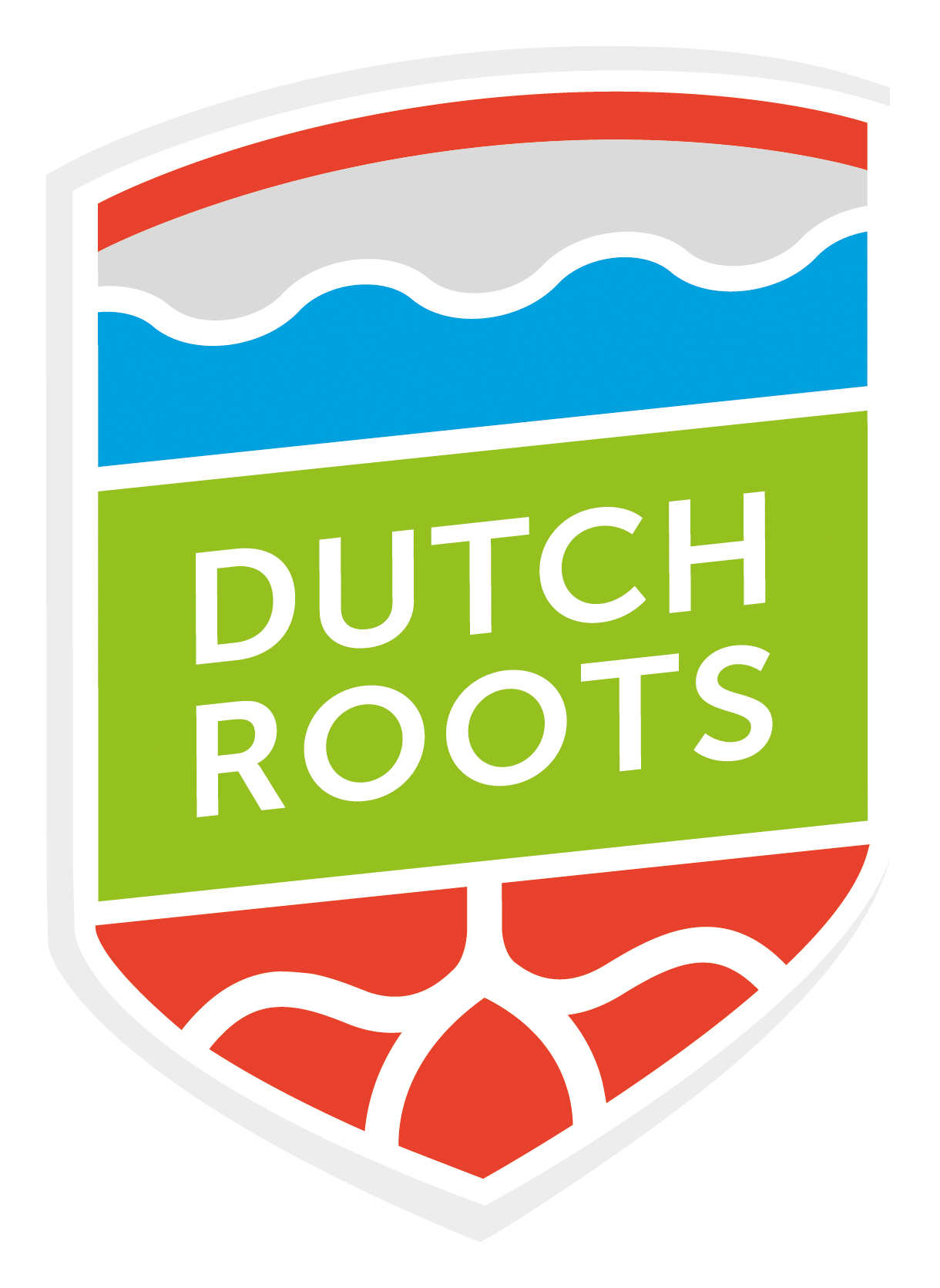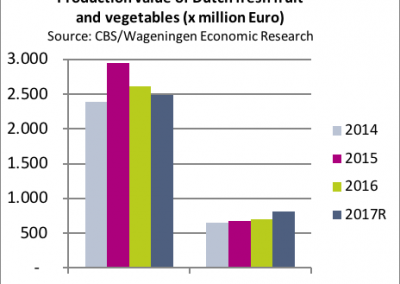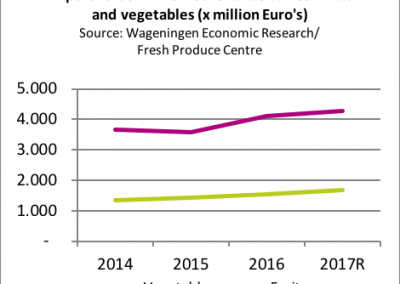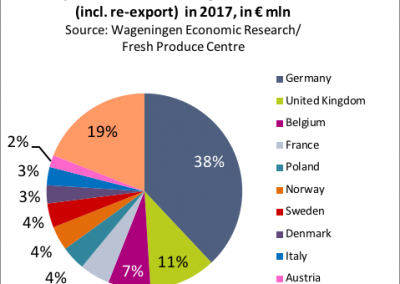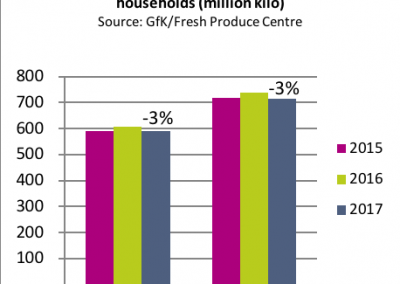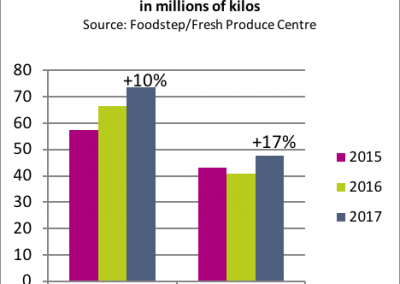Produce from Field to Fork
Saturday 14 July – Southern tour
The Netherlands is a global player in the field of fruit and vegetables. The fruit and vegetable cluster is the Netherlands’ third export sector and accounts for almost € 14 billion (including processed products). The Netherlands exports fresh fruit and vegetables to 150 countries across the world. In three out of four countries worldwide, shops sell fruit and vegetables from the Netherlands. What makes the Dutch fruit and vegetables cluster that big? This tour will guide you to some leading companies in the fruit and vegetable business. Thanks to knowledge sharing, research and innovation, there was much opportunity for the sector to grow. These three components come together in this tour.
Rijk Zwaan
Rijk Zwaan Nederland is the Dutch sales company of the global Rijk Zwaan company: an international breeding company specialised in vegetables with more than 2,800 employees working in 30 subsidiaries all over the world.
Rijk Zwaan is positioned right at the start of the food chain. They produce more than 1,000 vegetable varieties, featuring increasingly better combinations of desired traits for growers, processors, traders and consumers. Rijk Zwaan applies state-of-the-art techniques to the rich genetic diversity that is offered by nature. Within a global network of leading research institutes and universities, Rijk Zwaan is constantly working to further improve the effectiveness and efficiency of the breeding process.
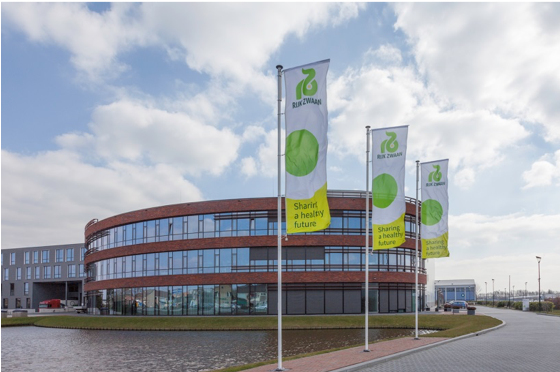
Company structure
Three families own approximately 90 percent of Rijk Zwaan. The remaining 10 percent of the company is owned by a large group of employees through the employee share scheme. Every year, each colleague has the chance to buy share certificates and hence to participate financially in Rijk Zwaan. That ensures employees are loyal to the company.
Long term vision
Rijk Zwaan was, is and always will be an independent enterprise. The company is convinced that this form of enterprise offers the best starting point for success in the short and long term. The determination of the shareholders to continue as an autonomous company, together with the specific company culture, forms a strong motivation for Rijk Zwaan employees around the world.
Market position
Rijk Zwaan is amongst the top five vegetable breeding companies in the world. They have chosen to focus fully on vegetable seeds and offer a wide assortment within the sector.
Sales structure
To sell all the varieties, Rijk Zwaan opts for a local approach. The seeds are sold through 30 local subsidiaries. In countries where Rijk Zwaan does not have their own subsidiaries, they work with distributors. All of these companies operate at the heart of their particular market and take local climate conditions and market conditions into account.
Innovation
In order to develop new varieties and supply top-quality seeds, continuous innovation is essential. Forty percent of the employees of Rijk Zwaan are actively involved in research and development. Rijk Zwaan invests around 30 percent of their turnover in R&D each year.
Today we visit the Trial Center Tomato in Kwintsheul. This greenhouse offers a wide range of tomato varieties in combination with international types of cucumber, eggplants and sweet pepper. Today you get the chance to see, smell and taste some of those varieties.
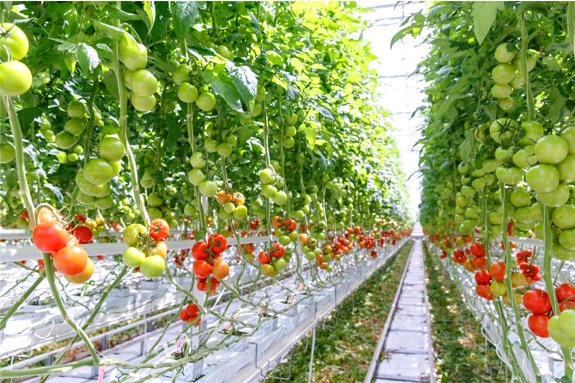
On a yearly basis Rijk Zwaan produces around 100 different tomatoes in the Trial Center Tomato, from snack and candy tomatoes to big meaty tomatoes. The surface of the greenhouse is 12,500 m2. This year Rijk Zwaan produces about 40 ‘old’ varieties and around 60 new varieties on substrate.
The Trial Center Tomato is recently extended with a compartment of production with assimilation light. In this part Rijk Zwaan tests how 51 tomato varieties act under hybrid lighting. In this way Rijk Zwaan responds to companies around the world that increasingly opt for lighted cultivation. Rijk Zwaan follows the cultivation process and the yield of the varieties very accurately and compares this data with the standard varieties in all market segments.
Koppert Cress
Although the history of Koppert Cress goes back to 1987, the company’s growth and success started when Rob Baan took over in July 2002. Rob not only changed the name of the company to ‘Koppert Cress’, he also had a vision and a drive to do things differently. With a long experience as a professional traveller, Rob came into contact with many cultures, ingredients and food habits. He was able to link his business knowledge from the seed industry with the culinary treasures he encountered on his travels, being a passionate home-cooking chef himself.

Architecture Aromatique
Koppert Cress specializes in cresses; seedlings of unique plants, which each have their own specific effect on the senses. Flavour, fragrance, feel or presentation – there is a cress variety for everyone. And the assortment is growing. Every year at least one new item is added to the collection of Micro-vegetables, a collection, which is presented as ‘Architecture Aromatique’.
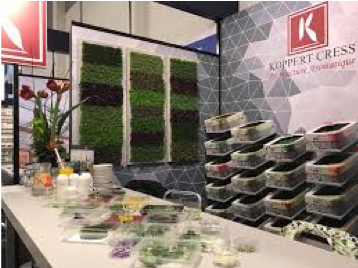
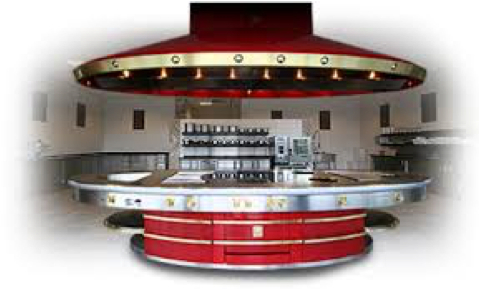
Cressperience
In 2006, the greenhouses, located in Monster in the Dutch ‘Westland’ area, were expanded to 1.7 ha and a brand new section was added to the facilities. Koppert Cress has a direct approach of the users of cresses, to ensure awareness and create demand for its unique products. Koppert Cress participates at a lot of trade fairs in the fruit and vegetable sector and also concerning the out of home market. There’s no restaurant where Rob Baan has eaten and didn’t bring a box of cresses in the kitchen. He even invested in a very special kitchen where chefs from all over the world are eager to cook. Cressperience is a meeting room with a demonstration kitchen where chefs are introduced to the products and can experiment with them. The end users are mainly chefs, restaurants, caterers, hotels and food services. Reliable supply of the fresh and tasteful ingredients allows chefs to be creative and surprise their guests.
Abroad
Since January 2007, Koppert Cress has also been offering its products in the USA. In October of last year, special greenhouses were prepared on Long Island to generate a reliable supply of fresh produce. Co-operation and partnership with fruit and vegetable wholesalers guarantees distribution across the US.
Awards
In recent years the company has received several awards, recognizing the innovative approach of the product and the market. Twice the ‘AGF innovation award’ was presented to Koppert Cress, a prestigious biannual award given by a jury of peers in the Dutch vegetable industry. But also the gastronomic world has learned about the achievements of Koppert Cress and come to appreciate its products.
For Rob Baan, after receiving the title ‘Honourable member of Les Amis Saisonnier’ by ‘Culinaire Saisonnier’, and being elected ‘Man of the Year’ by the Dutch trade magazine ‘Vakblad AGF’, the international recognition came with the coveted ‘Premo Internacional Martiko a la callidad del producto’ was given to him at the ‘Lo Mejor de la Gastrononia’ in San Sebastian, Spain.
Lunch based on vegetables
Besides all of this Rob Baan wants his employees to be healthy. In order to help them to eat enough fruit and vegetables according to the recommendations of the World Health Organisation, Rob provides a free lunch for every employee based on fruit and vegetables.
Nature’s Pride
Nature’s Pride supplies over 500 unique fruits and vegetables from more than 70 countries – from ready-to-eat and exotic fruits and vegetables to delicious berries and off-season products. Since it was founded in 2001, Nature’s Pride has become a specialist in supplying the most unique and tasty fresh fruits and vegetables to retail and wholesale customers around the world.
Nature’s Pride is the number one specialist in ripening mangoes and avocadoes in the Netherlands. The products can be recognized by the brand Eat me (www.eatme.eu) They also offer a range of fruits, vegetables, berries, organic products and kitchen tools.
Nature’s Pride is based in Maasdijk, close to the Port of Rotterdam, which is a big gateway to Europe for overseas products, such as mangoes and avocadoes, but also grapes, pineapples etc.
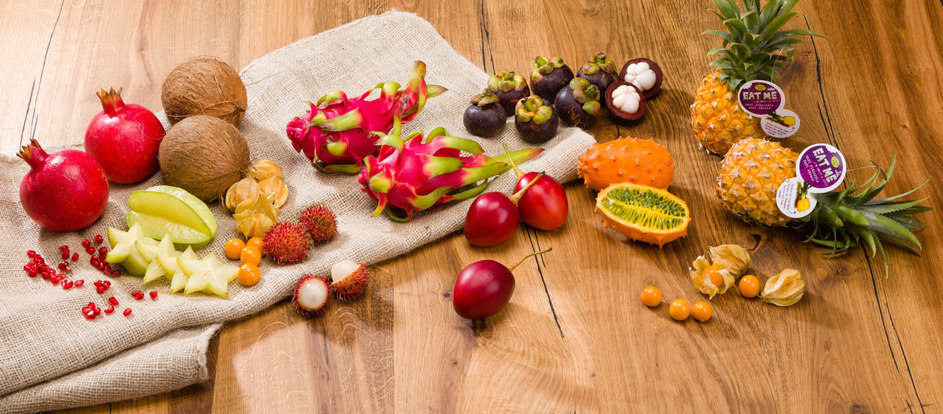
Largest ripener
Nature’s Pride is the first and largest mango and avocado ripener in Europe. Every day, Nature’s Pride works with passion and attention to detail to provide the highest service level to their growers and customers. We build sustainable partnerships and create a positive environment where inspiration and new innovations are born.
Co- operation throughout the chain
Nature’s Pride works in long-term partnerships with their suppliers. To ensure the growing demand on products the company works with around 300 suppliers in 70 different countries. Nature’s Pride is strongly committed to good and efficient co-operation throughout the chain. They consider growers to be their indirect colleagues and together constantly seek ways to improve quality. Everything revolves around the taste and experience of their products. That’s why they start at the source. We select only the best, most flavourful varieties and make ‘picking agreements’. That means that the fruits and vegetables are only harvested when they’ve reached just the right stage of ripeness. Prior to harvesting, the products are checked to ensure they meet specifications.
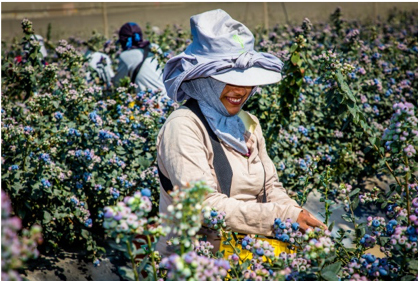
Good working conditions
Nature’s Pride makes sure their growers offer good working conditions, and pay a fair price for the products. In addition, companies undergo an IMO social audit, so that all employees in the country of origin are assured good working conditions. We also contribute to the social and economic development of the communities in which our growers’ employees live. We do this by working with our growers to set up local projects.
Safe and respectful working conditions
Employees are very important for every company in the fruit and vegetable business. In order to select and retain good employees, it is important to create good labour facilities. Nature’s Pride is an example of a company that makes big efforts for the wellbeing of their employees. Together with management and human resources, sustainable business strives to create safe and respectful working conditions at Nature’s Pride. They find that a good employer actively facilitates and achieves core values like transparency, integrity and cooperation.
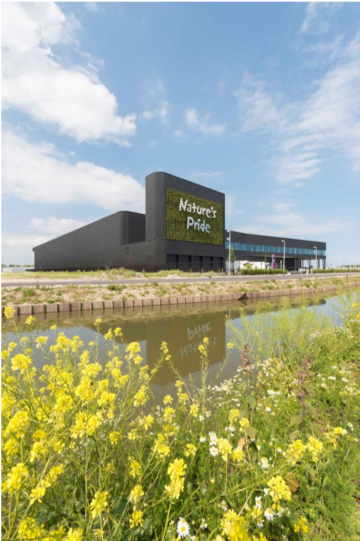
Nature’s Pride supports the professional development of their employees by offering specific training and in-house language education. Regarding health, Nature’s Pride offers its employees the possibility to participate in various sporting activities. They also organize ‘Nature’s Cross’ every year, where they run with colleagues, family and friends for a good cause. Nature’s Pride pays a lot of attention to good food and offers healthy meals for a fair price.
World Horti Center
The World Horti Center is the global knowledge and innovation center for international greenhouse horticulture. The center offers educational, research and presentation services for anyone active in the international greenhouse horticulture sector. The new building was completed and occupied by mid-August 2017.
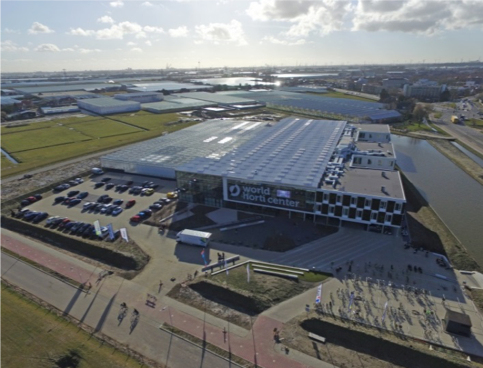
The unique point of World Horti Center is the cooperation between research, education and business.
The center benefits public health and well-being of people by providing solutions to sustainability goals related to water quality, food supply, food safety and sustainability.World Horti Center is the leading innovations center of the international greenhouse horticulture sector. It’s a platform where business, education and government jointly innovate, connect, create and inspire. Each year, the center is visited by some 25,000 international professionals.
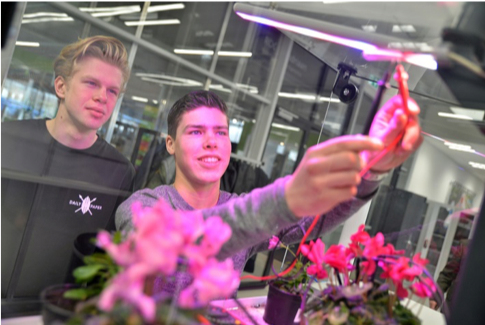
Cooperation of Education, Research and Government
MBO Westland (Educational)
MBO Westland is an Education Group for students between the ages of 16 and 20. It provides practical and vocational courses and educates students to become specialists and professionals for various sectors. With courses in trade, business services, engineering, green, care and food, the MBO Westland education portfolio addresses the needs of the regional business community.
Demokwekerij Westland (Research)
Part of Proeftuin Zwaagdijk and co-initiator of World Horti Center, this organization has been around for 15 years. It focuses on innovations in the glass horticulture sector through practical research, year-round exhibition and knowledge transfer.
Demokwekerij Westland is the connecting link between (innovative) business, education and research, promoting and advancing Dutch horticulture (technology) in the Netherlands as well as worldwide. Practical work is being done on the processes, techniques and resources that are needed for tomorrow’s nursery. Demokwekerij Westland connects parties from throughout the sector to each other.
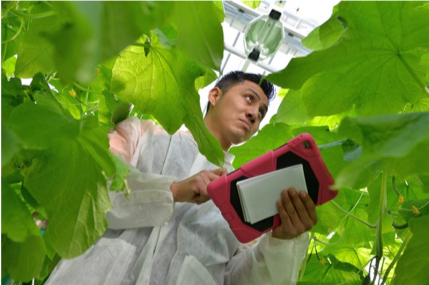
Minicipality of Westland (Government)
Westland is the largest contiguous greenhouse horticultural community in the world and has a unique economic strength that is associated with great social responsibility. The uniqueness of the Westland region is the cluster of greenhouse-related companies and sectors that jointly provide solutions to food, water and energy issues. Examples of greenhouse horticultural companies include: importers, exporters, growers, transport and packaging companies, suppliers and seed breeding companies.
With a gross municipal product of € 4.1 billion, Westland belongs to the top ten Dutch municipalities when it comes to the added value of economic activities and is a municipality of global economic significance.
In order to stay internationally competitive, development in knowledge and innovation is essential. The base for innovation in the (glass) horticulture sector continues to be education and knowledge development, in close cooperation with entrepreneurs.
With the birth of World Horti Center, Westland provides the international knowledge and innovation center of the international (glass) horticulture sector. A center that innovates, connects, creates and inspires business, education and government.
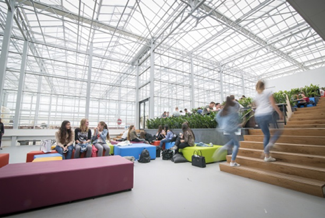
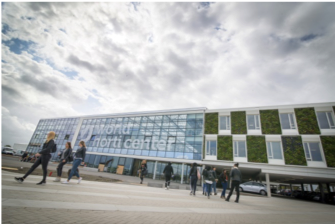
Fruit and vegetables in the Netherlands (2017)
(These facts were presented at the start of 2017 and give a global overview of the sector)
Production in the Netherlands: Changing success
- Growers’ turnover of vegetables decreased by 5% compared to 2016 to €2.5 billion
- Fruit sales rose by 17% to €0.8 billion; it was a difficult year for apple and pear growers
- Tomato, eggplant and soft fruit were better paid
- Less competition from tomatoes from Spain due to a smaller area and less supply
Import: Higher import amount of vegetables from Spain
- Total value of imports of fresh fruit and vegetables: €6.0 billion, + 6%
- Increase mainly for vegetables with + 9% (fruit + 5%)
- Extreme winter weather in southern Europe had repercussions on vegetable production
- As a result of the first quarter of 2017: less supply, higher prices and even temporary shortages
- Top three imports: grapes, bananas and avocadoes
- The role of the Netherlands as a banana importer is increasing; import continues
- Top three fruit and vegetable origins: Spain (16%), South Africa (12%), and Chile (9%)
Export: Tomato made the difference
- Export fruit and veg €9.6 billion (including re-export), + 2% (fruit + 4% / vegetables + 1%)
- The amount of exported tomatoes is 13% higher due to higher prices in winter and autumn
- The export value of avocado, banana, blueberry and grapefruit increased
- Germany has a share of 37% export market number one for fruit and vegetables
- In 2017, larger volumes of onions were sold in countries such as Senegal, Ivory Coast and England
- Dutch peppers more sought after in England (+ 9%), but fewer exports to the US (-18%)
Dutch consumers: less consumption at home, but more out of home
- By weight, Dutch households bought 3% less fresh fruit and vegetables
- Volume decreased because consumers make purchases less often
- In 2017, we had more expensive products: 2% higher expenditure on both vegetables and fruit
- Purchasing of fresh fruit and vegetables by catering and catering (foodservice) rose by 13%
- Especially in restaurants, the trend towards more fresh fruit and vegetables continues
- Foodservice increase do not completely offset the lower household purchase
- We still eat much less fruit and vegetables in the Netherlands than recommended
- 22% of the volume of fresh vegetables purchased is pre-processed; 34% of expenses
- Consumers spent 5% more on organic fruit and vegetables in supermarkets
- The sale of meal salads rises; still small share (2%) vegetable sales supermarket

